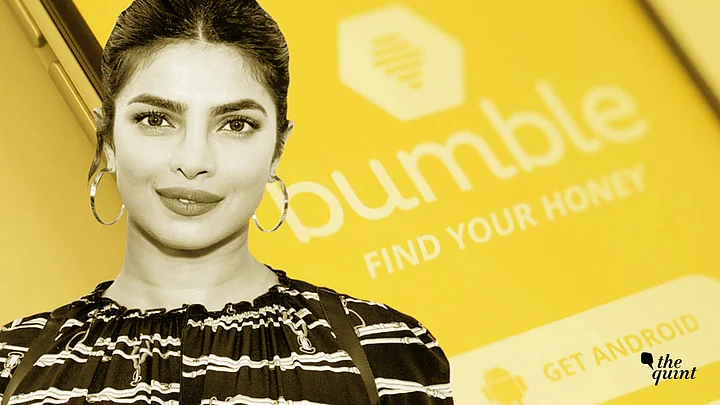Launched in 2014, the American dating and social networking company ‘Bumble’ attempted to change the rules of the game of online romance, and of women’s courtship experience. With the marketing tagline “make the first move”, the Bumble app requires all interactions to be initiated by the woman.
Regarded as the fastest growing dating app in America, Bumble has now debuted in India with a hard-hitting hashtag #EqualNotLoose, aiming to destabilise stereotypical assumptions about women and men.
However, social class and alternative sexualities get bludgeoned under the heavy, (up)lifting narrative of freedom and empowerment.
Undoubtedly, the campaign’s title exposes our society’s hypocrisy where professional ambitions and romantic goals of women are often met with suspicion and censure.
The sleek ad featuring the recently-married Priyanka Chopra Jonas, shows how sexual ‘respectability’ is articulated through a narrative that is embedded in the discourse of heterosexual desire, and upper middle-class womanhood.
In the 90 seconds ad, Priyanka Chopra, the paragon of a modern Indian woman who is, as the company website notes, “curious”, “confident” and “free” (and obviously “busy”, by extension) is seen in different capacities that challenge the gender order to some degree, and yet, doesn’t threaten it all together.
The opening scene of the ad has Chopra-Jonas as the boss-woman complimenting men for their hard work, followed by two quick scenes representing the free-woman incarnate where she is seen meeting up with a date at an upscale bar, and sweating it out in the gym (shedding both calories and the jacket) with a gal pal.
The ad concludes with the male partner volunteering to share cooking duties, while she lovingly casts her female gaze on her “equal” partner. On her forearm, there is a tattoo that says, “daddy’s little girl” sending reassuring signals to the Indian audience – what better way than to combine modern sexual sensibilities with patrilineal tenderness?
2018: India’s ‘Summer of Love’
Nonetheless, Bumble’s arrival provides a fitting rejoinder to India’s sexual awakening orchestrated through Bollywood and popular media. In a way, 2018 was almost the “summer of love” for India.
For example, Bollywood films like Veere Di Wedding, Manmarziyaan, or Amazon Prime’s Mirzapur or say, Netflix’s Lust Stories, attempted to push the boundaries of sexual permissiveness among women, by offering unabashed portrayals of female self-pleasure and sexual fantasies while turning normative promiscuity (known to benefit men more than women) on its head.
Concurrently, the contestations around the #MeToo movement in India scaffolded the second-wave feminist slogan, “the personal is political”, implying how women’s “personal” life experiences are inextricably rooted in the subordinated position that women as a collective have in the gender order.
New Representations of Female Sexuality
Unwittingly, these new representations of female sexuality opens up the cultural possibility of what British sociologist Anthony Giddens calls “pure” relationship, a noteworthy feature of the modern romantic love complex, that is premised on sexual and emotional equality.
This transformation of intimate relations, Giddens argue, offers democratic and desirable alternatives to the ones that are tied to procreation (fairly synonymous to marriage in India).
And in this new purchase of intimacy, individuals are seen as autonomous agents who are responsible for their own romantic destinies, combining love with values of consumer rationality.
‘Bumble Has Struck All the Right Chords’
Sociologist Eva Illouz, in her celebrated book Consuming the Romantic Utopia, shows how, through rituals (dating, vacationing) and products (beauty, diet, fitness), modern love has been commodified, rationalised and staged, offering a heady mix of amour and economics.
Seen this way, Bumble has struck all the right chords in this newfound sexual landscape of India.
Finally, the choice of Chopra-Jonas is an intriguing one. With her recently successful transnational career, Chopra-Jonas signals appropriate Indianness and a capable cultural transmitter of ambivalent modernity. In her new hyphenated self (Bollywood-Hollywood actor), Chopra-Jonas obfuscates the conventional cultural binaries of global-local, east-west, tradition and modernity.
Her socially legitimised relationship status invokes normative codes of upper middle-class respectable sexuality and hence, perhaps unwittingly, preserves the putative and definable Indian cultural-moral ideals around sex.
Significantly, in this new rendering of “equality”, Bumble’s beehive will be most likely the one that flutters with heteronormative, urban, English-speaking upper middle class women.
(Tannistha Samanta, PhD, is Assistant Professor, Social Demography, Humanities and Social Sciences at the Indian Institute of Technology, Gandhinagar. This is an opinion piece and the views expressed above are the author’s own. The Quint neither endorses nor is responsible for the same.)
